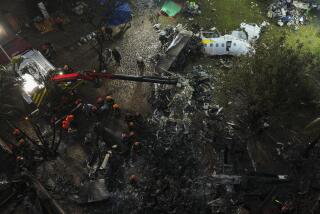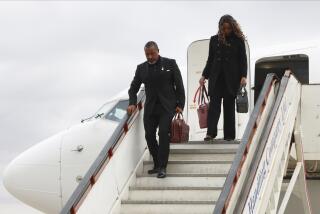Mozambique’s Leader Dies in S. Africa Crash
- Share via
JOHANNESBURG, South Africa — President Samora M. Machel of Mozambique was killed late Sunday when his twin-engine jet crashed in bad weather into a wooded hillside just inside South Africa, officials here said Monday.
The crash killed 28 others, including at least one member of the Mozambican Cabinet and several senior government officials, according to South Africa’s Bureau for Information. A total of 10 people, among them a member of the Soviet flight crew, survived and have been hospitalized here.
Body Identified
The fiery crash occurred about 25 miles south of the border town of Komatipoort, as Machel was returning from talks with other African leaders in Zambia. The accident was not reported until Monday morning, after the wreckage was found and Machel’s badly mutilated body had been identified.
The tragedy seems certain to deepen Mozambique’s already grave problems. Machel, 53, had led Mozambique to independence from Portugal in 1975, becoming its first president. Over the last decade, he held the country of more than 14 million together through severe famines and a devastating civil war with rightist rebels.
Machel’s charismatic leadership was Mozambique’s “single greatest asset,” a sympathetic European diplomat commented, and “without it, the future is very uncertain.”
In Maputo, Mozambique’s capital, the government at first announced only that Machel’s plane was missing and that the country’s leadership had gathered to “assess the situation.”
But the somber music on Radio Mozambique confirmed for most people the truth of reports broadcast from South Africa that Machel was dead, and groups gathered on the street corners of the capital to talk about the president’s death and what would follow.
Finally, Marcelino dos Santos, the No. 2 man in Mozambique’s ruling party, announced that Machel and other senior officials died in the crash “in circumstances not yet clarified.”
Security Forces on Alert
Mozambicans were urged by the government to remain calm and to be vigilant against any rebel efforts to take take advantage of the situation. Maputo’s airport was closed for a time, and security forces, already in a state of high alert, were deployed through the capital.
There was no immediate word on Machel’s successor. An expected communique from the daylong meeting of the 140-member Central Committee of the ruling Frelimo party was not issued.
“A great sadness has descended over the country,” said Mota Lopes of the Center for African Studies at Maputo’s Eduardo Mondlane University. “For many, many people, Samora Machel was not just the president of Mozambique, but the embodiment of our struggle for independence and liberation, for democracy and social justice and progress. . . .
“They know, of course, that the nation is more than one man, however great he may be, but it’s truly a time of grief and of uncertainty.”
South African Foreign Minister Roelof F. (Pik) Botha, who visited the crash site, expressed his own concerns about what will follow Machel’s death.
‘Man Who Sought Peace’
“At that moment, as I viewed his body, I just thought to myself that, for all of us in southern Africa, it is time to really search for peace . . . and I believe that he was a man who sought peace.”
Botha said the South African government will undertake an investigation with Mozambique and experts from the International Civil Aviation Organization to determine the cause of the crash. The plane’s flight recorders have been recovered intact and will be available for international inspection, he added. He refused to speculate on the cause of the crash.
Botha quoted one of the survivors, hospitalized in the South African town of Nelspruit, as telling police that just before the plane, a Soviet-made Tupolev 134A jet airliner, was to land in bad weather at Maputo, he heard a loud noise inside the aircraft and that it began to vibrate violently.
Crashes Near Village
The pilot apparently decided to circle again before landing. Straying a few hundred yards across the border into South Africa, the plane hit a hill near the village of Mbuzini, according to South African officials.
Lt. Gen. Denis Earp, the South African air force commander, said the plane disappeared from radar screens at 9:16 p.m. Sunday (local time) but that there was no earlier indication of trouble.
The plane somersaulted over the hill, sparing the village, and crashed on the other side, rescue workers concluded. The nose of the plane was found on the hilltop, and the rest of the wreckage, little of which was recognizable, was spread over an area more than 250 yards in radius. Bodies, most of them dismembered, were scattered up and down the hillside.
‘Really Gruesome’
“It was really gruesome,” Botha said. “Some of the bodies were badly mutilated.”
Machel’s body was covered with a white sheet, and a soldier was detailed to hold a black umbrella over the corpse to protect it from the day’s hot sun and intermittent thunderstorms. A Mozambique military plane took the body back to Maputo on Monday afternoon.
The South African government, apparently wanting to allay any suspicion that foul play was responsible for the crash, immediately arranged for senior Mozambican officials to fly to the site. President Pieter W. Botha sent not only Pik Botha, the foreign minister, to the scene but also Gen. Magnus Malan, the defense minister; Gen. Johan Coetzee, the national police commissioner, and several other senior officers.
Relations between the two countries had become severely strained in recent months.
Mozambique accused South Africa of violating their 1984 nonaggression pact by supporting guerrillas of the right-wing Mozambique National Resistance, which has won a series of battles against government troops.
Charges by Pretoria
Pretoria, for its part, has charged Maputo with allowing guerrillas of the outlawed African National Congress, the main group fighting minority white rule here, to use its territory for cross-border terrorist attacks and has threatened to retaliate.
The African National Congress immediately blamed South Africa or the Mozambique National Resistance Movement for the crash.
“Either the South African government itself is guilty of this heinous crime or its henchmen, the Mozambican guerrillas, are,” Alfred Nzo, the organization’s secretary-general, said in Copenhagen.
Only last week, a senior Mozambican journalist, Carlos Cardozo, the editor of the national news agency AIM, wrote from Maputo that Machel’s “assassination appears to be in the minds of the South African generals, and there are already certain public indications of this.”
In a sharply worded statement last Wednesday, Malan denounced Mozambique’s support for the African National Congress and warned that it and South Africa’s other neighbors are “co-responsible (for the ANC’s actions) and should be aware of the results.”
“President Machel has chosen the path of terror, and he now experiences the results,” Malan said in what most political observers here took as a threat of direct attacks on suspected African National Congress targets in Mozambique.
However, President Botha on Monday described Machel as “an influential ally in (South Africa’s) efforts to develop the economies of southern Africa” and said that “Africa had lost an exceptional leader.”
Spokesmen for the right-wing Mozambican guerrillas rejoiced in Machel’s death.
“Machel was Frelimo,” said Paulo Oliveira, the European spokesman for the Mozambique National Resistance, in Lisbon. “Only with great difficulty will Frelimo be able to survive without him and to overcome its internal divisions.”
Among the other identified victims of the crash, according to the South African government information bureau, were Mozambique’s minister of transport, the country’s deputy foreign minister, the director-general of the defense ministry, several close aides of Machel and Prof. Aquino de Braganca, director of the Center for African Studies at Eduardo Mondlane University, an adviser to Machel and one of the country’s best known intellectuals. The Zambian and Zairean ambassadors to Maputo were also killed. All the bodies will be flown to Maputo, the bureau said.
Times researcher Michael Cadman contributed to this story from Komatipoort, South Africa.
More to Read
Sign up for Essential California
The most important California stories and recommendations in your inbox every morning.
You may occasionally receive promotional content from the Los Angeles Times.












